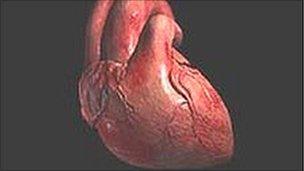New drug found for irregular heart beats
- Published

About 800,000 people in the UK have irregular heart beats
Patients with irregular heart beats could benefit from a drug that is easier to administer than the current standard treatment.
The condition, which affects about 800,000 people in the UK, can lead to blood clots forming and significantly increases the risk of stroke.
The standard treatment, warfarin, was compared with the drug rivaroxaban.
Rivaroxaban was found to be as effective as warfarin in reducing the risk of stroke.
The study was led by Edinburgh University and the Duke University in North Carolina, North America.
Stroke can be four to six times higher in patients with irregular heart beats.
Both drugs work by reducing the clotting of the blood but, as a result, can increase the risk of bleeding.
The impact of warfarin can be affected by other medications and diet, so patients taking it must be closely monitored to ensure they are receiving the correct dose.
Rivaroxaban does not need to be so closely monitored, nor the dose adjusted, the study found.
'Too frail'
Researchers studied 14,000 patients with irregular heat beats and at risk of stroke, a condition known as atrial fibrillation, who were given either warfarin or rivaroxaban.
The study also found the incidence of bleeding was similar for both drugs.
The risk of fatal bleeding on the brain was halved (from five per 1,000 to approximately two per 1,000) among patients taking rivaroxaban.
Atrial fibrillation can affect adults of any age, but is more common as people get older, affecting about 10% of over-65s.
Professor Keith Fox, from Edinburgh University, said: "We know that about a third of patients eligible for warfarin are not currently receiving it.
"This may be because they are too frail and may not be able to manage taking the drug appropriately, with the need for blood tests and dosage levels to be monitored closely.
"This study shows that an alternative drug for patients with irregular heart beats is just as effective while also easier to prescribe and take."
The study is published in the New England Journal of Medicine.
- Published17 November 2010
- Published15 November 2010